Critical Evaluation of Leadership Coaching Research - BUS703, S1 2018
VerifiedAdded on 2023/06/11
|12
|2524
|443
Report
AI Summary
This report critically evaluates a research article on leadership coaching, focusing on its impact on leader self-efficacy and trust in subordinates. The evaluation covers the data analysis strategy, research ethics, and implications for leadership theory. The report assesses the use of hypothesis testing, regression analysis, and correlation analysis in the quantitative part of the research. It also examines how ethical considerations were addressed, including participant consent and data security. Furthermore, the report discusses the implications of the research for self-efficacy, motivational, and behavioral leadership theories, and assesses whether the researchers achieved their stated objectives. Desklib provides access to similar solved assignments and study tools for students.
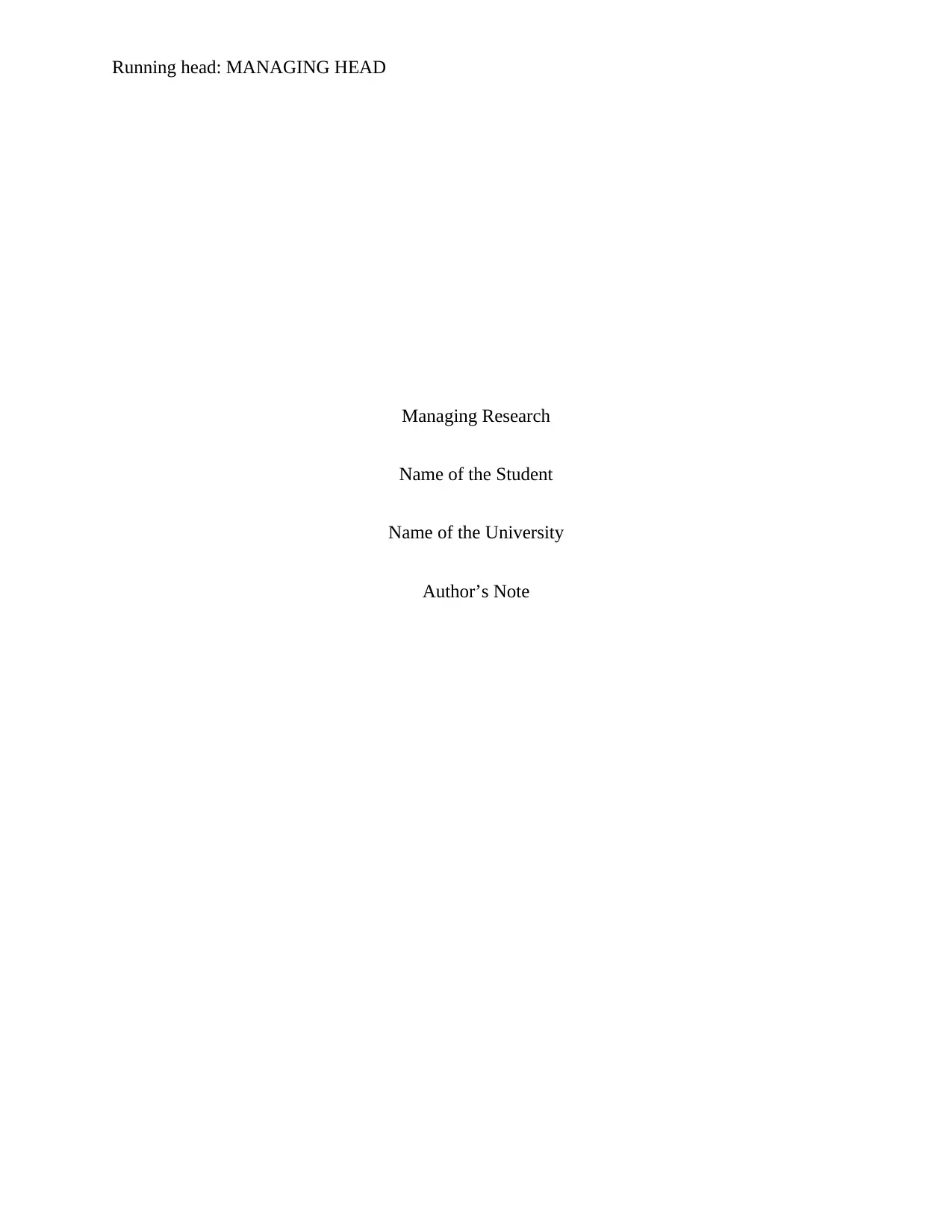
Running head: MANAGING HEAD
Managing Research
Name of the Student
Name of the University
Author’s Note
Managing Research
Name of the Student
Name of the University
Author’s Note
Paraphrase This Document
Need a fresh take? Get an instant paraphrase of this document with our AI Paraphraser
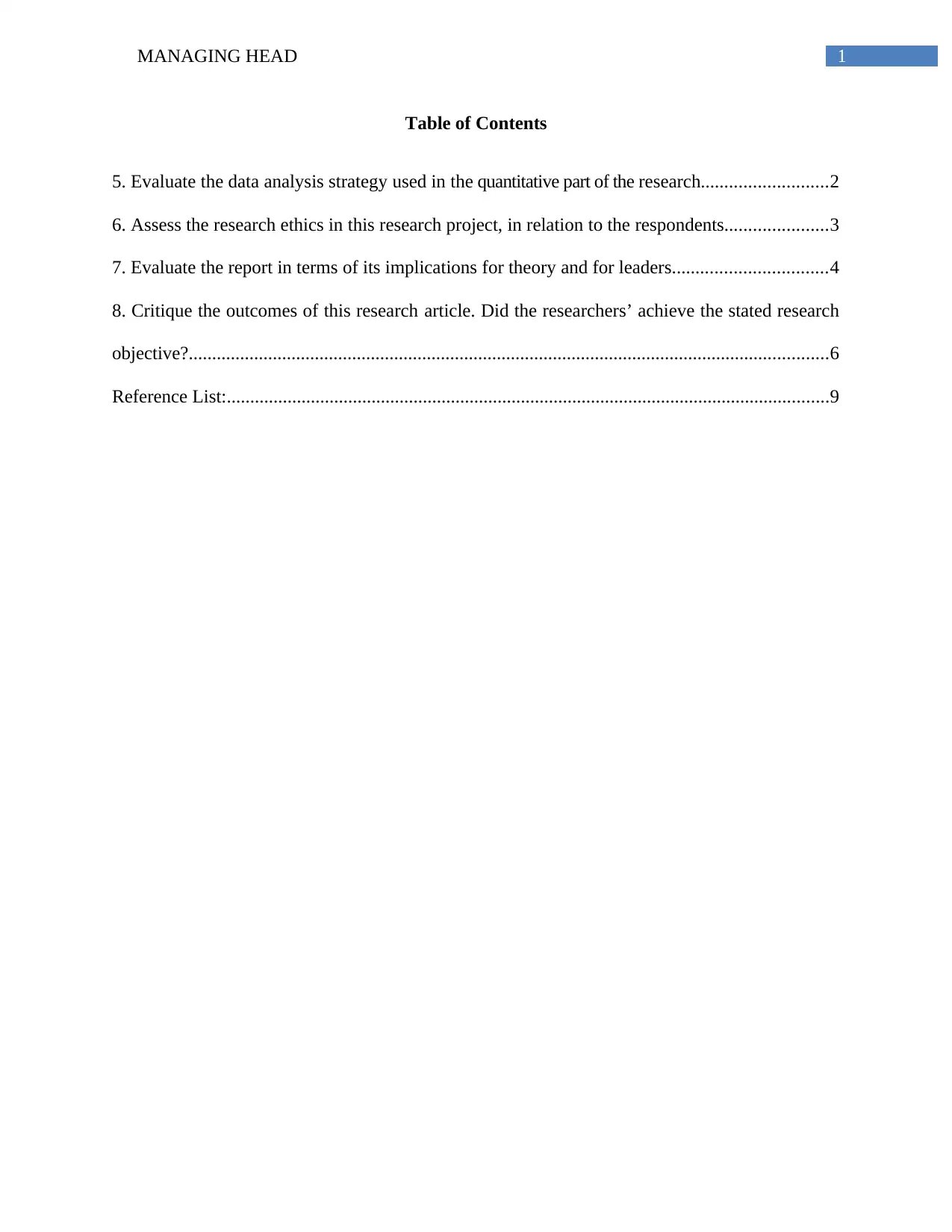
1MANAGING HEAD
Table of Contents
5. Evaluate the data analysis strategy used in the quantitative part of the research...........................2
6. Assess the research ethics in this research project, in relation to the respondents......................3
7. Evaluate the report in terms of its implications for theory and for leaders.................................4
8. Critique the outcomes of this research article. Did the researchers’ achieve the stated research
objective?.........................................................................................................................................6
Reference List:.................................................................................................................................9
Table of Contents
5. Evaluate the data analysis strategy used in the quantitative part of the research...........................2
6. Assess the research ethics in this research project, in relation to the respondents......................3
7. Evaluate the report in terms of its implications for theory and for leaders.................................4
8. Critique the outcomes of this research article. Did the researchers’ achieve the stated research
objective?.........................................................................................................................................6
Reference List:.................................................................................................................................9
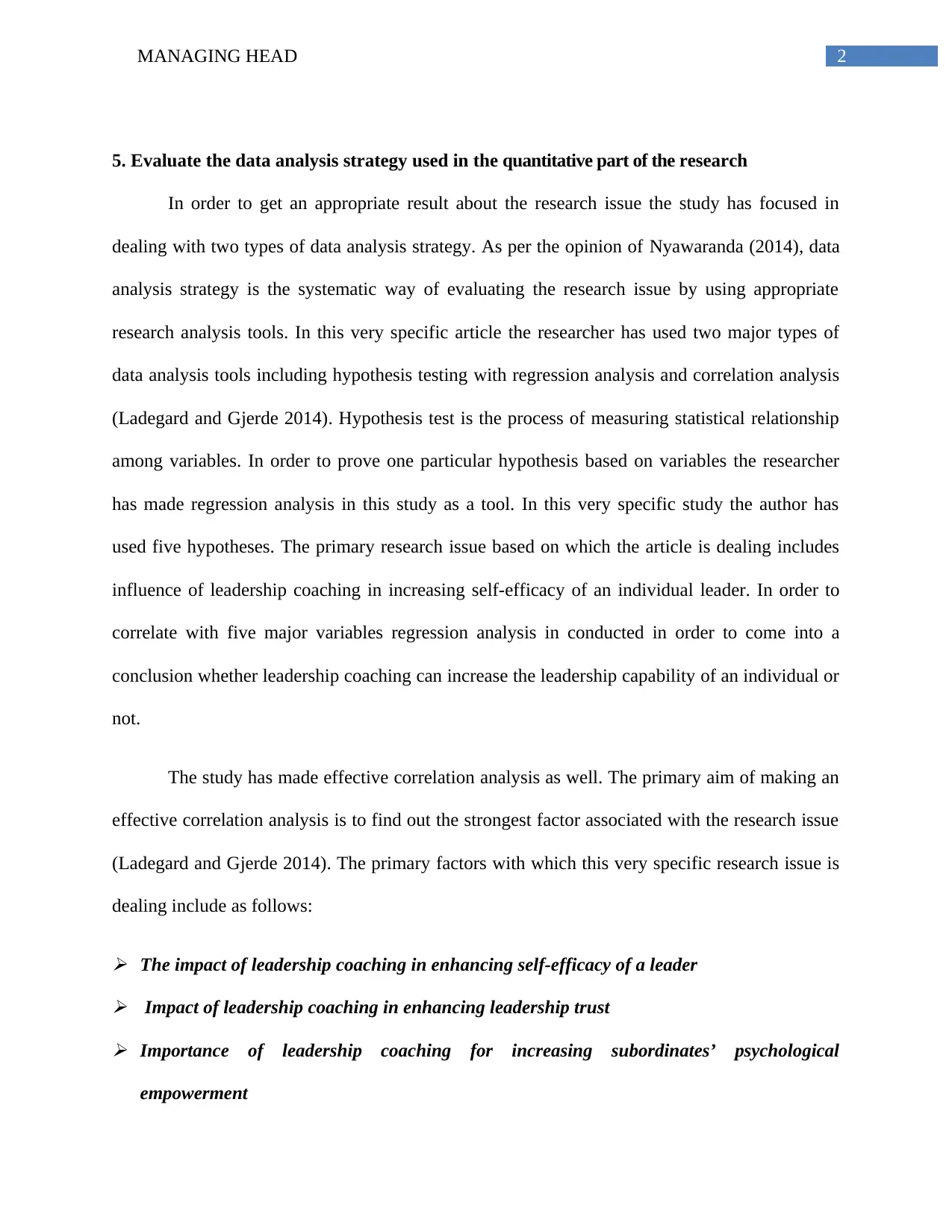
2MANAGING HEAD
5. Evaluate the data analysis strategy used in the quantitative part of the research
In order to get an appropriate result about the research issue the study has focused in
dealing with two types of data analysis strategy. As per the opinion of Nyawaranda (2014), data
analysis strategy is the systematic way of evaluating the research issue by using appropriate
research analysis tools. In this very specific article the researcher has used two major types of
data analysis tools including hypothesis testing with regression analysis and correlation analysis
(Ladegard and Gjerde 2014). Hypothesis test is the process of measuring statistical relationship
among variables. In order to prove one particular hypothesis based on variables the researcher
has made regression analysis in this study as a tool. In this very specific study the author has
used five hypotheses. The primary research issue based on which the article is dealing includes
influence of leadership coaching in increasing self-efficacy of an individual leader. In order to
correlate with five major variables regression analysis in conducted in order to come into a
conclusion whether leadership coaching can increase the leadership capability of an individual or
not.
The study has made effective correlation analysis as well. The primary aim of making an
effective correlation analysis is to find out the strongest factor associated with the research issue
(Ladegard and Gjerde 2014). The primary factors with which this very specific research issue is
dealing include as follows:
The impact of leadership coaching in enhancing self-efficacy of a leader
Impact of leadership coaching in enhancing leadership trust
Importance of leadership coaching for increasing subordinates’ psychological
empowerment
5. Evaluate the data analysis strategy used in the quantitative part of the research
In order to get an appropriate result about the research issue the study has focused in
dealing with two types of data analysis strategy. As per the opinion of Nyawaranda (2014), data
analysis strategy is the systematic way of evaluating the research issue by using appropriate
research analysis tools. In this very specific article the researcher has used two major types of
data analysis tools including hypothesis testing with regression analysis and correlation analysis
(Ladegard and Gjerde 2014). Hypothesis test is the process of measuring statistical relationship
among variables. In order to prove one particular hypothesis based on variables the researcher
has made regression analysis in this study as a tool. In this very specific study the author has
used five hypotheses. The primary research issue based on which the article is dealing includes
influence of leadership coaching in increasing self-efficacy of an individual leader. In order to
correlate with five major variables regression analysis in conducted in order to come into a
conclusion whether leadership coaching can increase the leadership capability of an individual or
not.
The study has made effective correlation analysis as well. The primary aim of making an
effective correlation analysis is to find out the strongest factor associated with the research issue
(Ladegard and Gjerde 2014). The primary factors with which this very specific research issue is
dealing include as follows:
The impact of leadership coaching in enhancing self-efficacy of a leader
Impact of leadership coaching in enhancing leadership trust
Importance of leadership coaching for increasing subordinates’ psychological
empowerment
⊘ This is a preview!⊘
Do you want full access?
Subscribe today to unlock all pages.

Trusted by 1+ million students worldwide
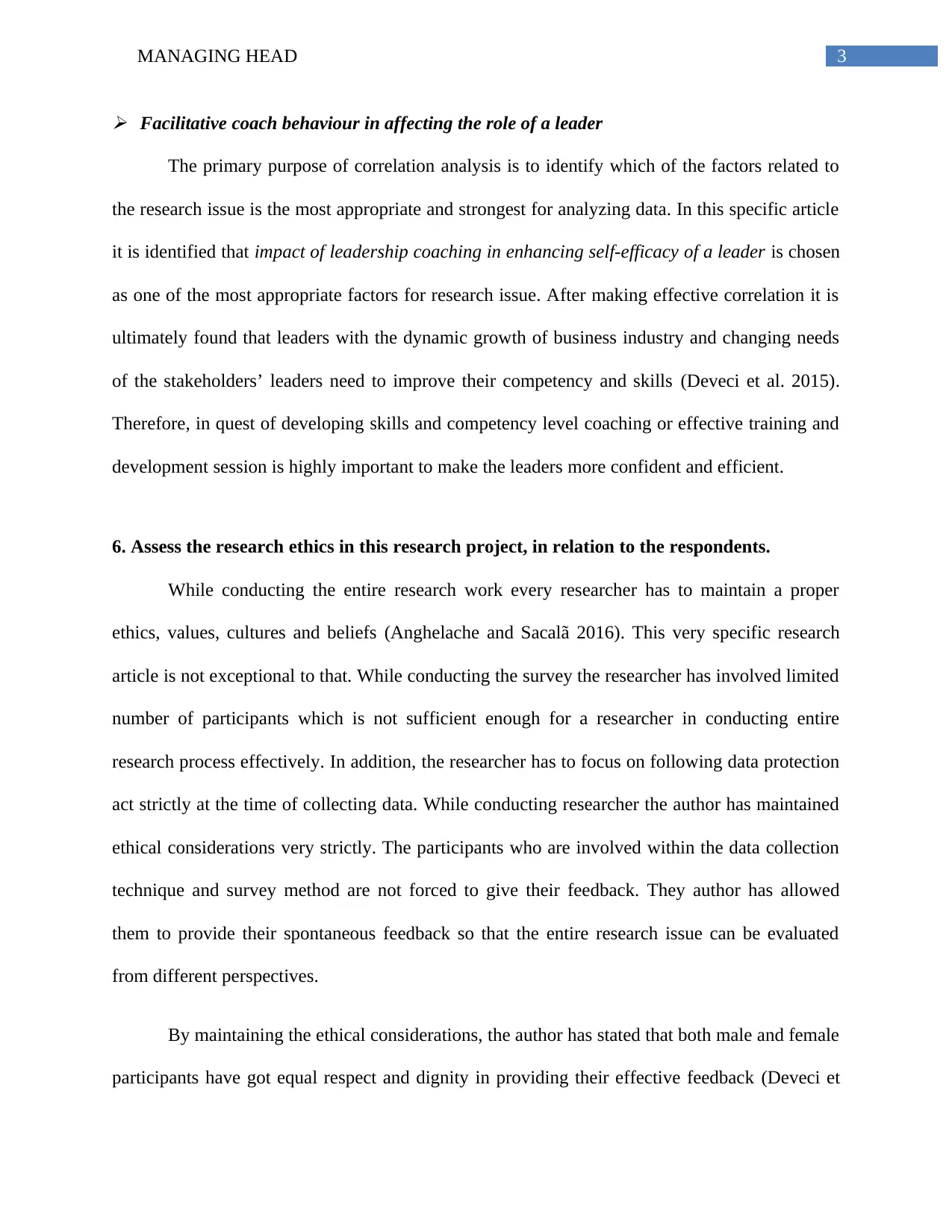
3MANAGING HEAD
Facilitative coach behaviour in affecting the role of a leader
The primary purpose of correlation analysis is to identify which of the factors related to
the research issue is the most appropriate and strongest for analyzing data. In this specific article
it is identified that impact of leadership coaching in enhancing self-efficacy of a leader is chosen
as one of the most appropriate factors for research issue. After making effective correlation it is
ultimately found that leaders with the dynamic growth of business industry and changing needs
of the stakeholders’ leaders need to improve their competency and skills (Deveci et al. 2015).
Therefore, in quest of developing skills and competency level coaching or effective training and
development session is highly important to make the leaders more confident and efficient.
6. Assess the research ethics in this research project, in relation to the respondents.
While conducting the entire research work every researcher has to maintain a proper
ethics, values, cultures and beliefs (Anghelache and Sacalã 2016). This very specific research
article is not exceptional to that. While conducting the survey the researcher has involved limited
number of participants which is not sufficient enough for a researcher in conducting entire
research process effectively. In addition, the researcher has to focus on following data protection
act strictly at the time of collecting data. While conducting researcher the author has maintained
ethical considerations very strictly. The participants who are involved within the data collection
technique and survey method are not forced to give their feedback. They author has allowed
them to provide their spontaneous feedback so that the entire research issue can be evaluated
from different perspectives.
By maintaining the ethical considerations, the author has stated that both male and female
participants have got equal respect and dignity in providing their effective feedback (Deveci et
Facilitative coach behaviour in affecting the role of a leader
The primary purpose of correlation analysis is to identify which of the factors related to
the research issue is the most appropriate and strongest for analyzing data. In this specific article
it is identified that impact of leadership coaching in enhancing self-efficacy of a leader is chosen
as one of the most appropriate factors for research issue. After making effective correlation it is
ultimately found that leaders with the dynamic growth of business industry and changing needs
of the stakeholders’ leaders need to improve their competency and skills (Deveci et al. 2015).
Therefore, in quest of developing skills and competency level coaching or effective training and
development session is highly important to make the leaders more confident and efficient.
6. Assess the research ethics in this research project, in relation to the respondents.
While conducting the entire research work every researcher has to maintain a proper
ethics, values, cultures and beliefs (Anghelache and Sacalã 2016). This very specific research
article is not exceptional to that. While conducting the survey the researcher has involved limited
number of participants which is not sufficient enough for a researcher in conducting entire
research process effectively. In addition, the researcher has to focus on following data protection
act strictly at the time of collecting data. While conducting researcher the author has maintained
ethical considerations very strictly. The participants who are involved within the data collection
technique and survey method are not forced to give their feedback. They author has allowed
them to provide their spontaneous feedback so that the entire research issue can be evaluated
from different perspectives.
By maintaining the ethical considerations, the author has stated that both male and female
participants have got equal respect and dignity in providing their effective feedback (Deveci et
Paraphrase This Document
Need a fresh take? Get an instant paraphrase of this document with our AI Paraphraser
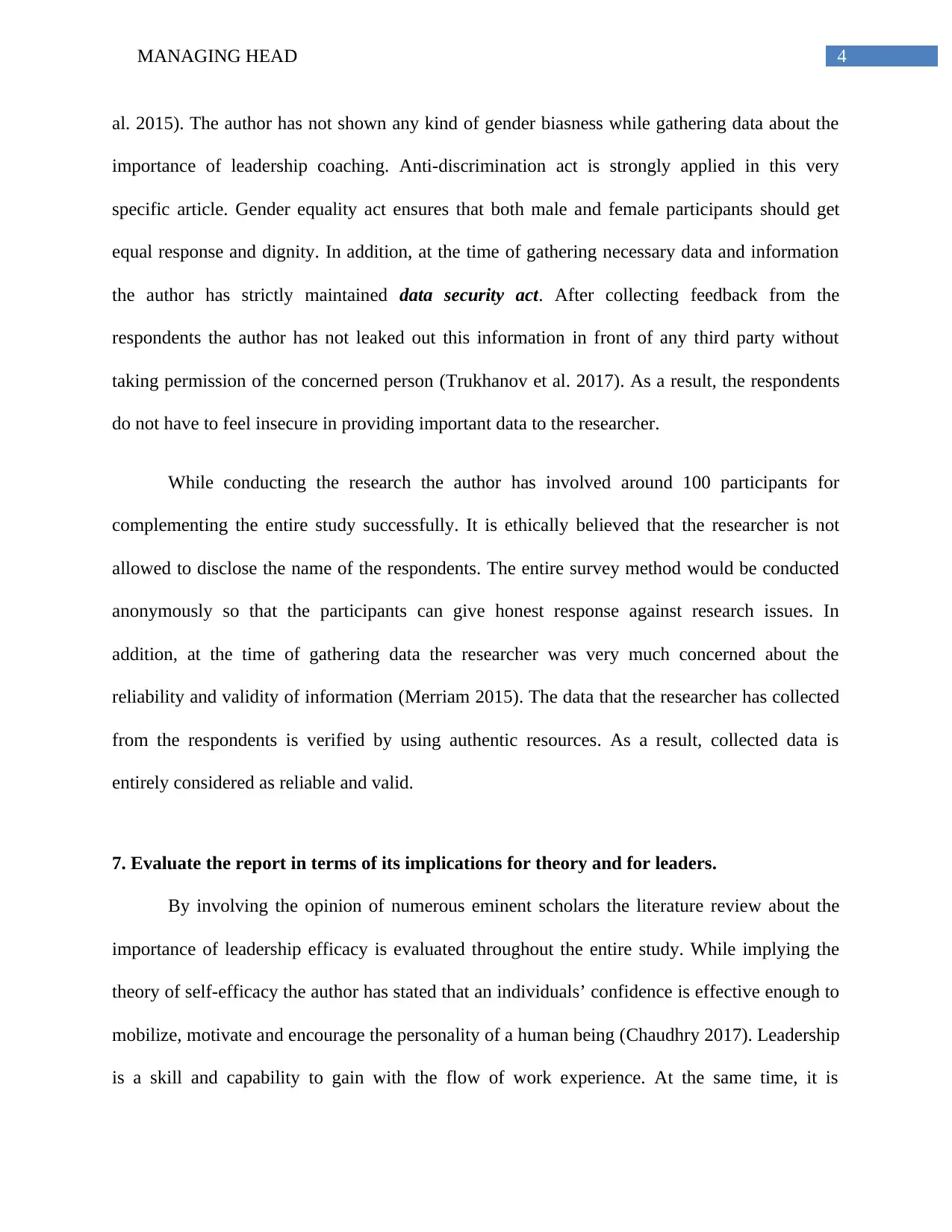
4MANAGING HEAD
al. 2015). The author has not shown any kind of gender biasness while gathering data about the
importance of leadership coaching. Anti-discrimination act is strongly applied in this very
specific article. Gender equality act ensures that both male and female participants should get
equal response and dignity. In addition, at the time of gathering necessary data and information
the author has strictly maintained data security act. After collecting feedback from the
respondents the author has not leaked out this information in front of any third party without
taking permission of the concerned person (Trukhanov et al. 2017). As a result, the respondents
do not have to feel insecure in providing important data to the researcher.
While conducting the research the author has involved around 100 participants for
complementing the entire study successfully. It is ethically believed that the researcher is not
allowed to disclose the name of the respondents. The entire survey method would be conducted
anonymously so that the participants can give honest response against research issues. In
addition, at the time of gathering data the researcher was very much concerned about the
reliability and validity of information (Merriam 2015). The data that the researcher has collected
from the respondents is verified by using authentic resources. As a result, collected data is
entirely considered as reliable and valid.
7. Evaluate the report in terms of its implications for theory and for leaders.
By involving the opinion of numerous eminent scholars the literature review about the
importance of leadership efficacy is evaluated throughout the entire study. While implying the
theory of self-efficacy the author has stated that an individuals’ confidence is effective enough to
mobilize, motivate and encourage the personality of a human being (Chaudhry 2017). Leadership
is a skill and capability to gain with the flow of work experience. At the same time, it is
al. 2015). The author has not shown any kind of gender biasness while gathering data about the
importance of leadership coaching. Anti-discrimination act is strongly applied in this very
specific article. Gender equality act ensures that both male and female participants should get
equal response and dignity. In addition, at the time of gathering necessary data and information
the author has strictly maintained data security act. After collecting feedback from the
respondents the author has not leaked out this information in front of any third party without
taking permission of the concerned person (Trukhanov et al. 2017). As a result, the respondents
do not have to feel insecure in providing important data to the researcher.
While conducting the research the author has involved around 100 participants for
complementing the entire study successfully. It is ethically believed that the researcher is not
allowed to disclose the name of the respondents. The entire survey method would be conducted
anonymously so that the participants can give honest response against research issues. In
addition, at the time of gathering data the researcher was very much concerned about the
reliability and validity of information (Merriam 2015). The data that the researcher has collected
from the respondents is verified by using authentic resources. As a result, collected data is
entirely considered as reliable and valid.
7. Evaluate the report in terms of its implications for theory and for leaders.
By involving the opinion of numerous eminent scholars the literature review about the
importance of leadership efficacy is evaluated throughout the entire study. While implying the
theory of self-efficacy the author has stated that an individuals’ confidence is effective enough to
mobilize, motivate and encourage the personality of a human being (Chaudhry 2017). Leadership
is a skill and capability to gain with the flow of work experience. At the same time, it is
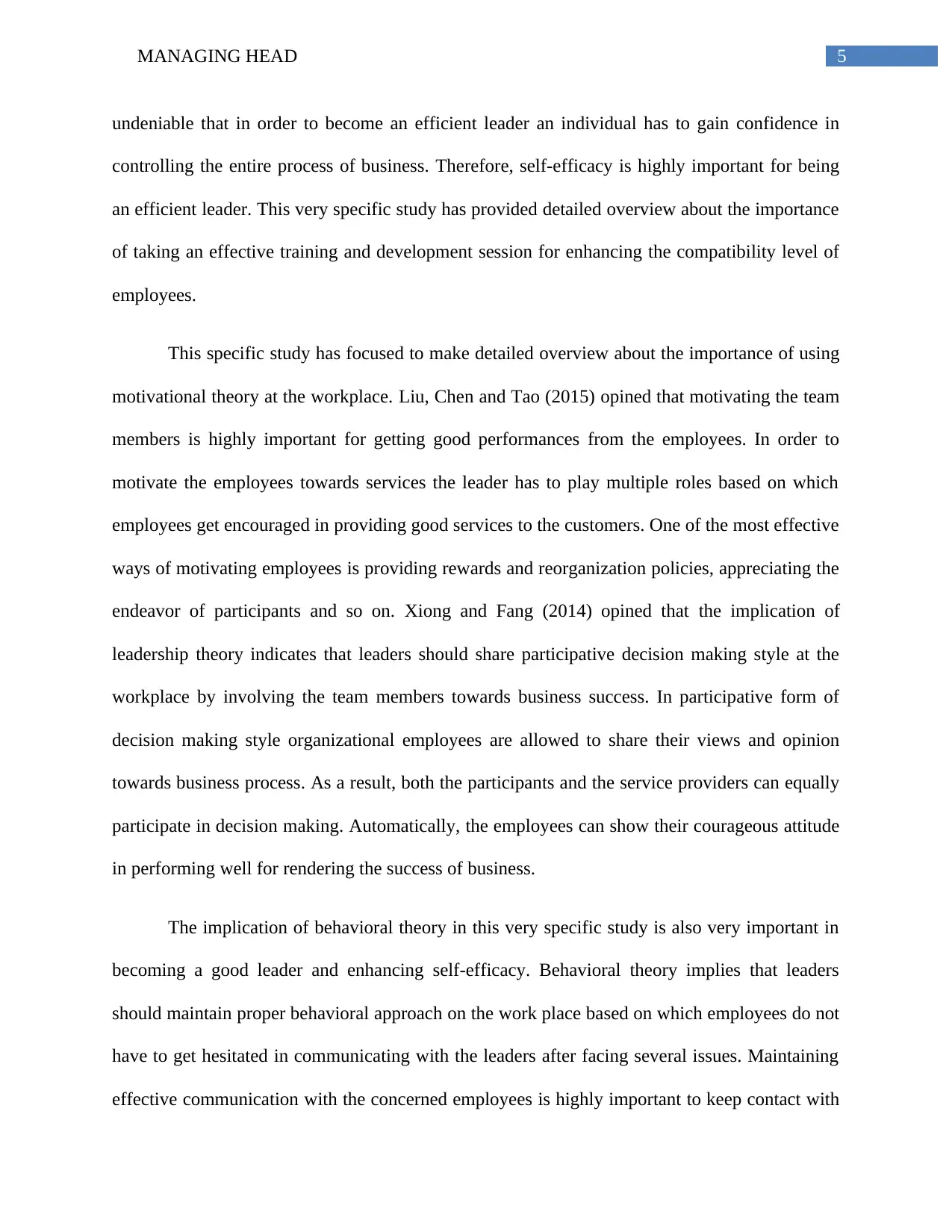
5MANAGING HEAD
undeniable that in order to become an efficient leader an individual has to gain confidence in
controlling the entire process of business. Therefore, self-efficacy is highly important for being
an efficient leader. This very specific study has provided detailed overview about the importance
of taking an effective training and development session for enhancing the compatibility level of
employees.
This specific study has focused to make detailed overview about the importance of using
motivational theory at the workplace. Liu, Chen and Tao (2015) opined that motivating the team
members is highly important for getting good performances from the employees. In order to
motivate the employees towards services the leader has to play multiple roles based on which
employees get encouraged in providing good services to the customers. One of the most effective
ways of motivating employees is providing rewards and reorganization policies, appreciating the
endeavor of participants and so on. Xiong and Fang (2014) opined that the implication of
leadership theory indicates that leaders should share participative decision making style at the
workplace by involving the team members towards business success. In participative form of
decision making style organizational employees are allowed to share their views and opinion
towards business process. As a result, both the participants and the service providers can equally
participate in decision making. Automatically, the employees can show their courageous attitude
in performing well for rendering the success of business.
The implication of behavioral theory in this very specific study is also very important in
becoming a good leader and enhancing self-efficacy. Behavioral theory implies that leaders
should maintain proper behavioral approach on the work place based on which employees do not
have to get hesitated in communicating with the leaders after facing several issues. Maintaining
effective communication with the concerned employees is highly important to keep contact with
undeniable that in order to become an efficient leader an individual has to gain confidence in
controlling the entire process of business. Therefore, self-efficacy is highly important for being
an efficient leader. This very specific study has provided detailed overview about the importance
of taking an effective training and development session for enhancing the compatibility level of
employees.
This specific study has focused to make detailed overview about the importance of using
motivational theory at the workplace. Liu, Chen and Tao (2015) opined that motivating the team
members is highly important for getting good performances from the employees. In order to
motivate the employees towards services the leader has to play multiple roles based on which
employees get encouraged in providing good services to the customers. One of the most effective
ways of motivating employees is providing rewards and reorganization policies, appreciating the
endeavor of participants and so on. Xiong and Fang (2014) opined that the implication of
leadership theory indicates that leaders should share participative decision making style at the
workplace by involving the team members towards business success. In participative form of
decision making style organizational employees are allowed to share their views and opinion
towards business process. As a result, both the participants and the service providers can equally
participate in decision making. Automatically, the employees can show their courageous attitude
in performing well for rendering the success of business.
The implication of behavioral theory in this very specific study is also very important in
becoming a good leader and enhancing self-efficacy. Behavioral theory implies that leaders
should maintain proper behavioral approach on the work place based on which employees do not
have to get hesitated in communicating with the leaders after facing several issues. Maintaining
effective communication with the concerned employees is highly important to keep contact with
⊘ This is a preview!⊘
Do you want full access?
Subscribe today to unlock all pages.

Trusted by 1+ million students worldwide
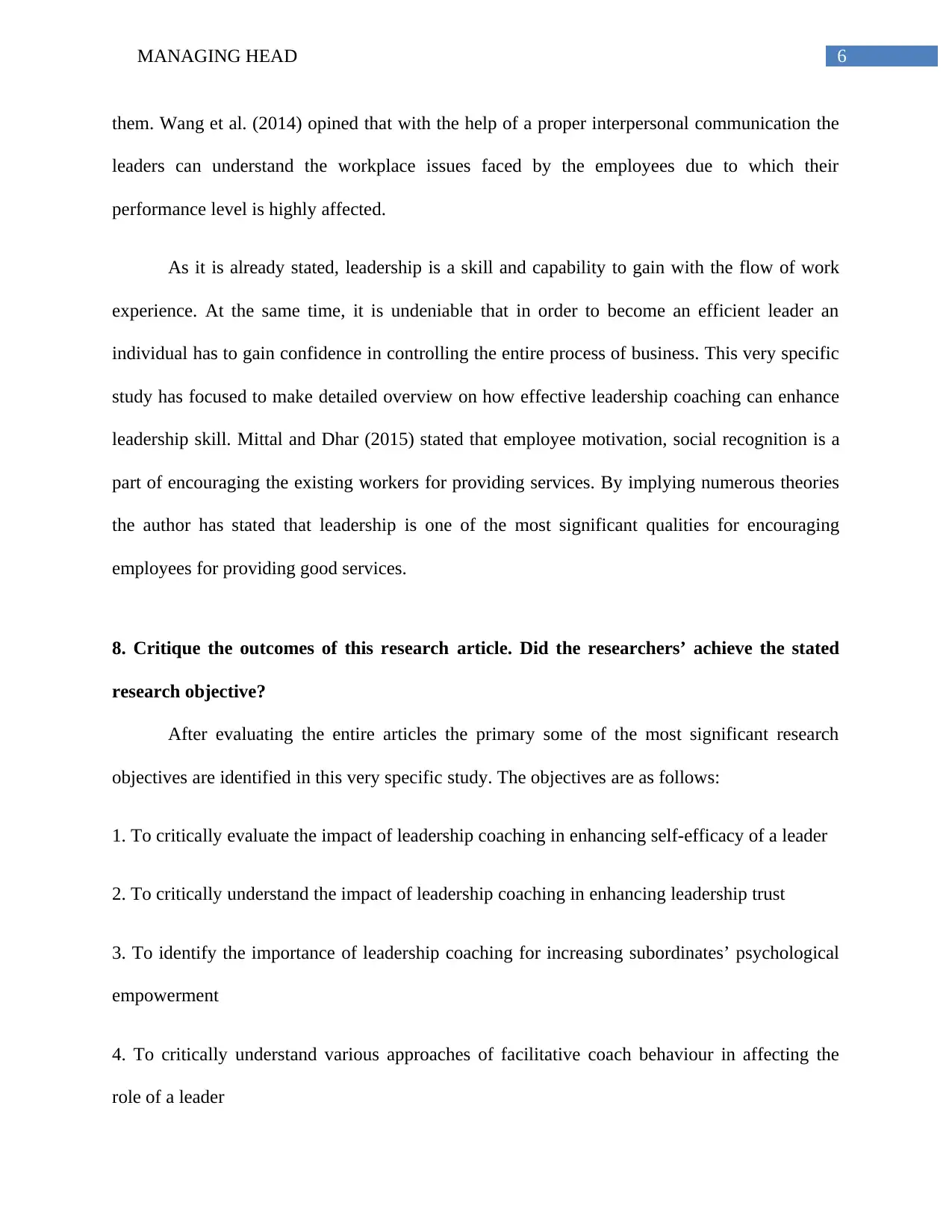
6MANAGING HEAD
them. Wang et al. (2014) opined that with the help of a proper interpersonal communication the
leaders can understand the workplace issues faced by the employees due to which their
performance level is highly affected.
As it is already stated, leadership is a skill and capability to gain with the flow of work
experience. At the same time, it is undeniable that in order to become an efficient leader an
individual has to gain confidence in controlling the entire process of business. This very specific
study has focused to make detailed overview on how effective leadership coaching can enhance
leadership skill. Mittal and Dhar (2015) stated that employee motivation, social recognition is a
part of encouraging the existing workers for providing services. By implying numerous theories
the author has stated that leadership is one of the most significant qualities for encouraging
employees for providing good services.
8. Critique the outcomes of this research article. Did the researchers’ achieve the stated
research objective?
After evaluating the entire articles the primary some of the most significant research
objectives are identified in this very specific study. The objectives are as follows:
1. To critically evaluate the impact of leadership coaching in enhancing self-efficacy of a leader
2. To critically understand the impact of leadership coaching in enhancing leadership trust
3. To identify the importance of leadership coaching for increasing subordinates’ psychological
empowerment
4. To critically understand various approaches of facilitative coach behaviour in affecting the
role of a leader
them. Wang et al. (2014) opined that with the help of a proper interpersonal communication the
leaders can understand the workplace issues faced by the employees due to which their
performance level is highly affected.
As it is already stated, leadership is a skill and capability to gain with the flow of work
experience. At the same time, it is undeniable that in order to become an efficient leader an
individual has to gain confidence in controlling the entire process of business. This very specific
study has focused to make detailed overview on how effective leadership coaching can enhance
leadership skill. Mittal and Dhar (2015) stated that employee motivation, social recognition is a
part of encouraging the existing workers for providing services. By implying numerous theories
the author has stated that leadership is one of the most significant qualities for encouraging
employees for providing good services.
8. Critique the outcomes of this research article. Did the researchers’ achieve the stated
research objective?
After evaluating the entire articles the primary some of the most significant research
objectives are identified in this very specific study. The objectives are as follows:
1. To critically evaluate the impact of leadership coaching in enhancing self-efficacy of a leader
2. To critically understand the impact of leadership coaching in enhancing leadership trust
3. To identify the importance of leadership coaching for increasing subordinates’ psychological
empowerment
4. To critically understand various approaches of facilitative coach behaviour in affecting the
role of a leader
Paraphrase This Document
Need a fresh take? Get an instant paraphrase of this document with our AI Paraphraser
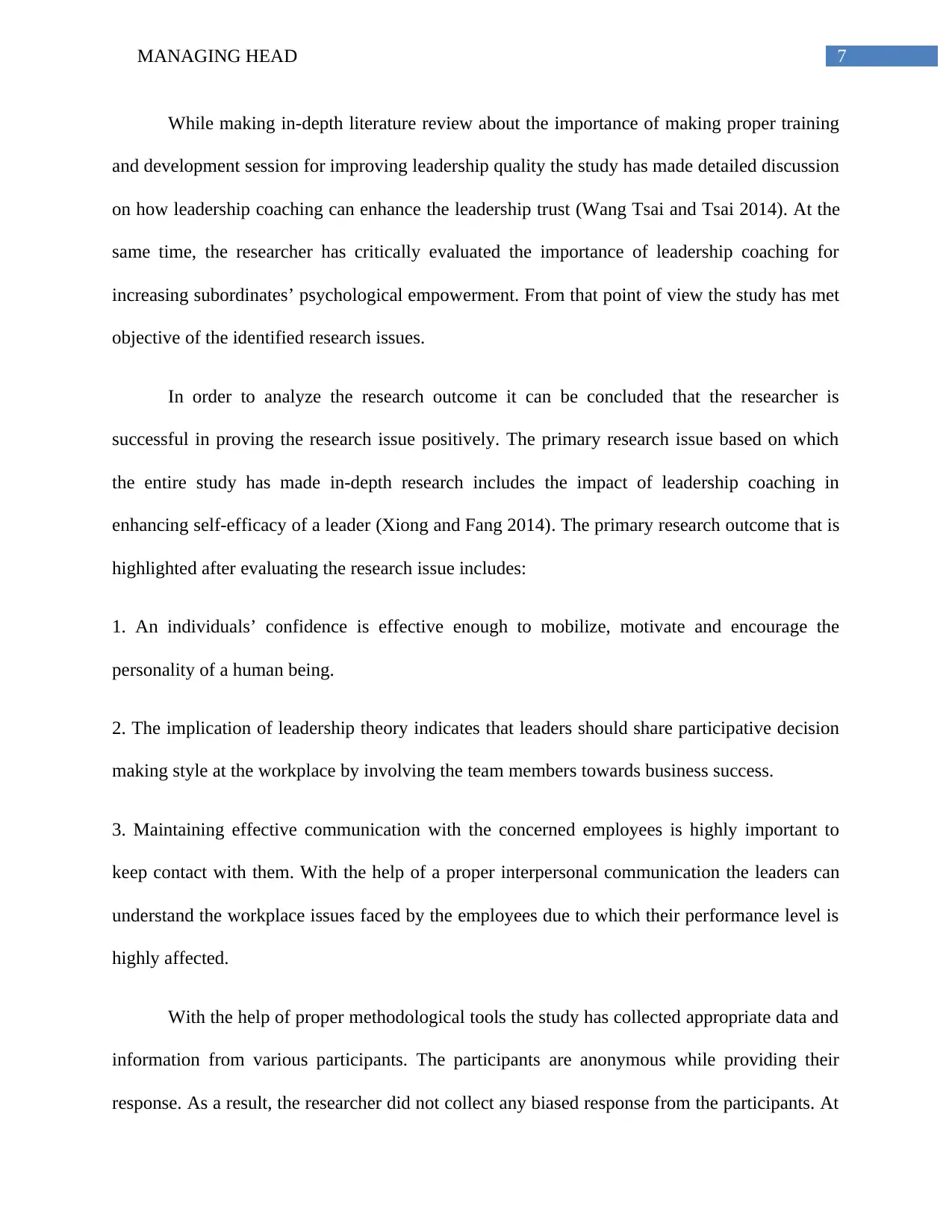
7MANAGING HEAD
While making in-depth literature review about the importance of making proper training
and development session for improving leadership quality the study has made detailed discussion
on how leadership coaching can enhance the leadership trust (Wang Tsai and Tsai 2014). At the
same time, the researcher has critically evaluated the importance of leadership coaching for
increasing subordinates’ psychological empowerment. From that point of view the study has met
objective of the identified research issues.
In order to analyze the research outcome it can be concluded that the researcher is
successful in proving the research issue positively. The primary research issue based on which
the entire study has made in-depth research includes the impact of leadership coaching in
enhancing self-efficacy of a leader (Xiong and Fang 2014). The primary research outcome that is
highlighted after evaluating the research issue includes:
1. An individuals’ confidence is effective enough to mobilize, motivate and encourage the
personality of a human being.
2. The implication of leadership theory indicates that leaders should share participative decision
making style at the workplace by involving the team members towards business success.
3. Maintaining effective communication with the concerned employees is highly important to
keep contact with them. With the help of a proper interpersonal communication the leaders can
understand the workplace issues faced by the employees due to which their performance level is
highly affected.
With the help of proper methodological tools the study has collected appropriate data and
information from various participants. The participants are anonymous while providing their
response. As a result, the researcher did not collect any biased response from the participants. At
While making in-depth literature review about the importance of making proper training
and development session for improving leadership quality the study has made detailed discussion
on how leadership coaching can enhance the leadership trust (Wang Tsai and Tsai 2014). At the
same time, the researcher has critically evaluated the importance of leadership coaching for
increasing subordinates’ psychological empowerment. From that point of view the study has met
objective of the identified research issues.
In order to analyze the research outcome it can be concluded that the researcher is
successful in proving the research issue positively. The primary research issue based on which
the entire study has made in-depth research includes the impact of leadership coaching in
enhancing self-efficacy of a leader (Xiong and Fang 2014). The primary research outcome that is
highlighted after evaluating the research issue includes:
1. An individuals’ confidence is effective enough to mobilize, motivate and encourage the
personality of a human being.
2. The implication of leadership theory indicates that leaders should share participative decision
making style at the workplace by involving the team members towards business success.
3. Maintaining effective communication with the concerned employees is highly important to
keep contact with them. With the help of a proper interpersonal communication the leaders can
understand the workplace issues faced by the employees due to which their performance level is
highly affected.
With the help of proper methodological tools the study has collected appropriate data and
information from various participants. The participants are anonymous while providing their
response. As a result, the researcher did not collect any biased response from the participants. At

8MANAGING HEAD
the same time, while interacting with the participants the author has maintained proper ethical
considerations. Therefore, the outcome of this research is considered positive.
the same time, while interacting with the participants the author has maintained proper ethical
considerations. Therefore, the outcome of this research is considered positive.
⊘ This is a preview!⊘
Do you want full access?
Subscribe today to unlock all pages.

Trusted by 1+ million students worldwide
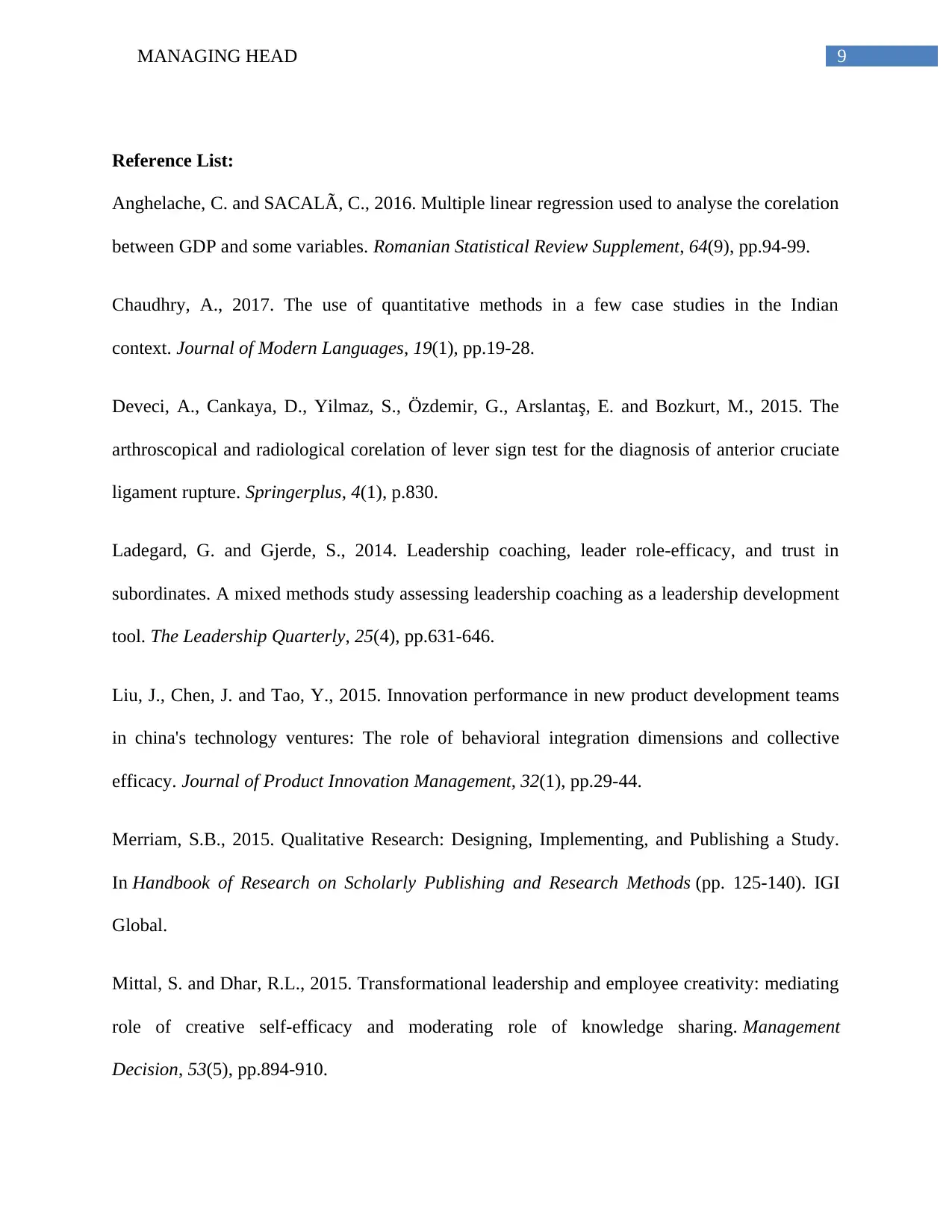
9MANAGING HEAD
Reference List:
Anghelache, C. and SACALÃ, C., 2016. Multiple linear regression used to analyse the corelation
between GDP and some variables. Romanian Statistical Review Supplement, 64(9), pp.94-99.
Chaudhry, A., 2017. The use of quantitative methods in a few case studies in the Indian
context. Journal of Modern Languages, 19(1), pp.19-28.
Deveci, A., Cankaya, D., Yilmaz, S., Özdemir, G., Arslantaş, E. and Bozkurt, M., 2015. The
arthroscopical and radiological corelation of lever sign test for the diagnosis of anterior cruciate
ligament rupture. Springerplus, 4(1), p.830.
Ladegard, G. and Gjerde, S., 2014. Leadership coaching, leader role-efficacy, and trust in
subordinates. A mixed methods study assessing leadership coaching as a leadership development
tool. The Leadership Quarterly, 25(4), pp.631-646.
Liu, J., Chen, J. and Tao, Y., 2015. Innovation performance in new product development teams
in china's technology ventures: The role of behavioral integration dimensions and collective
efficacy. Journal of Product Innovation Management, 32(1), pp.29-44.
Merriam, S.B., 2015. Qualitative Research: Designing, Implementing, and Publishing a Study.
In Handbook of Research on Scholarly Publishing and Research Methods (pp. 125-140). IGI
Global.
Mittal, S. and Dhar, R.L., 2015. Transformational leadership and employee creativity: mediating
role of creative self-efficacy and moderating role of knowledge sharing. Management
Decision, 53(5), pp.894-910.
Reference List:
Anghelache, C. and SACALÃ, C., 2016. Multiple linear regression used to analyse the corelation
between GDP and some variables. Romanian Statistical Review Supplement, 64(9), pp.94-99.
Chaudhry, A., 2017. The use of quantitative methods in a few case studies in the Indian
context. Journal of Modern Languages, 19(1), pp.19-28.
Deveci, A., Cankaya, D., Yilmaz, S., Özdemir, G., Arslantaş, E. and Bozkurt, M., 2015. The
arthroscopical and radiological corelation of lever sign test for the diagnosis of anterior cruciate
ligament rupture. Springerplus, 4(1), p.830.
Ladegard, G. and Gjerde, S., 2014. Leadership coaching, leader role-efficacy, and trust in
subordinates. A mixed methods study assessing leadership coaching as a leadership development
tool. The Leadership Quarterly, 25(4), pp.631-646.
Liu, J., Chen, J. and Tao, Y., 2015. Innovation performance in new product development teams
in china's technology ventures: The role of behavioral integration dimensions and collective
efficacy. Journal of Product Innovation Management, 32(1), pp.29-44.
Merriam, S.B., 2015. Qualitative Research: Designing, Implementing, and Publishing a Study.
In Handbook of Research on Scholarly Publishing and Research Methods (pp. 125-140). IGI
Global.
Mittal, S. and Dhar, R.L., 2015. Transformational leadership and employee creativity: mediating
role of creative self-efficacy and moderating role of knowledge sharing. Management
Decision, 53(5), pp.894-910.
Paraphrase This Document
Need a fresh take? Get an instant paraphrase of this document with our AI Paraphraser
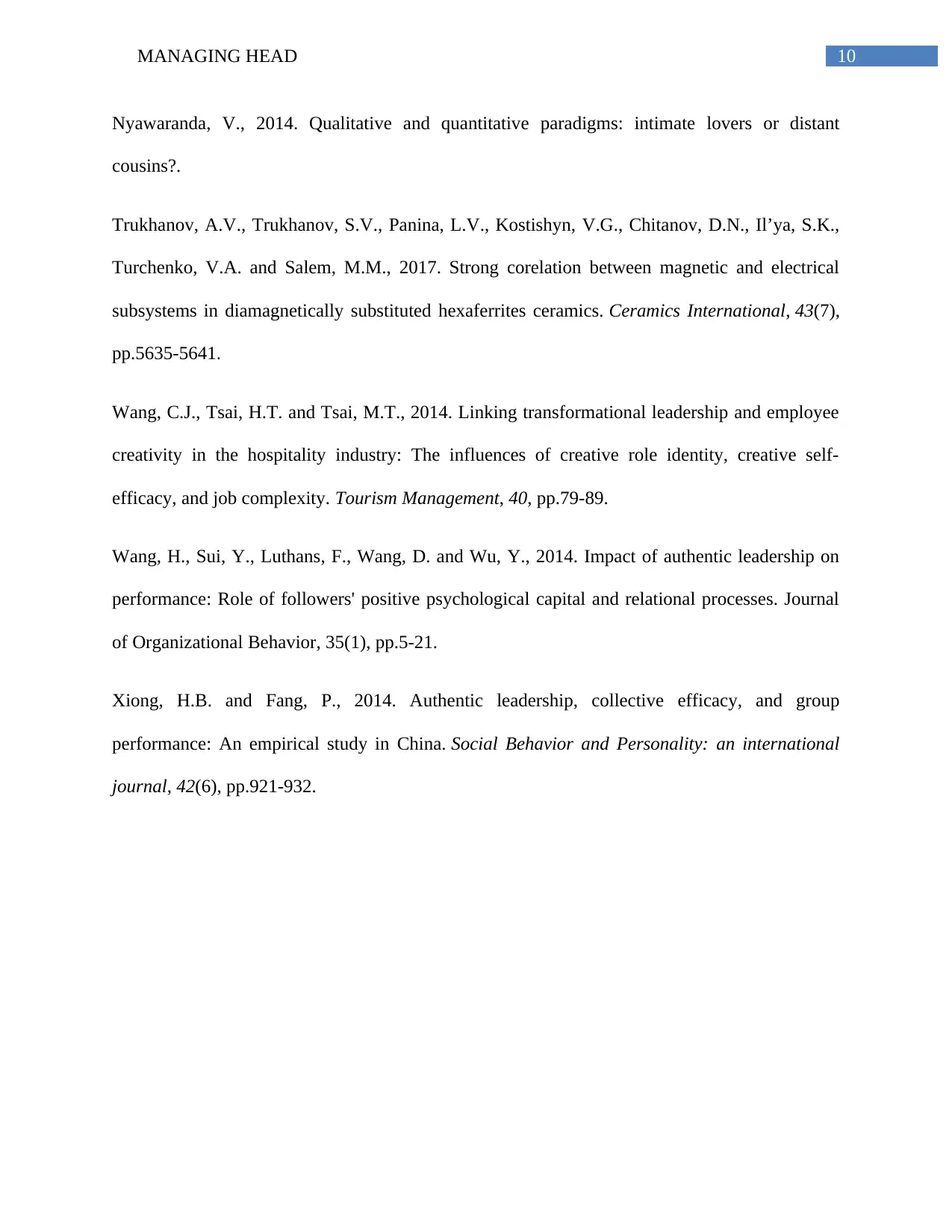
10MANAGING HEAD
Nyawaranda, V., 2014. Qualitative and quantitative paradigms: intimate lovers or distant
cousins?.
Trukhanov, A.V., Trukhanov, S.V., Panina, L.V., Kostishyn, V.G., Chitanov, D.N., Il’ya, S.K.,
Turchenko, V.A. and Salem, M.M., 2017. Strong corelation between magnetic and electrical
subsystems in diamagnetically substituted hexaferrites ceramics. Ceramics International, 43(7),
pp.5635-5641.
Wang, C.J., Tsai, H.T. and Tsai, M.T., 2014. Linking transformational leadership and employee
creativity in the hospitality industry: The influences of creative role identity, creative self-
efficacy, and job complexity. Tourism Management, 40, pp.79-89.
Wang, H., Sui, Y., Luthans, F., Wang, D. and Wu, Y., 2014. Impact of authentic leadership on
performance: Role of followers' positive psychological capital and relational processes. Journal
of Organizational Behavior, 35(1), pp.5-21.
Xiong, H.B. and Fang, P., 2014. Authentic leadership, collective efficacy, and group
performance: An empirical study in China. Social Behavior and Personality: an international
journal, 42(6), pp.921-932.
Nyawaranda, V., 2014. Qualitative and quantitative paradigms: intimate lovers or distant
cousins?.
Trukhanov, A.V., Trukhanov, S.V., Panina, L.V., Kostishyn, V.G., Chitanov, D.N., Il’ya, S.K.,
Turchenko, V.A. and Salem, M.M., 2017. Strong corelation between magnetic and electrical
subsystems in diamagnetically substituted hexaferrites ceramics. Ceramics International, 43(7),
pp.5635-5641.
Wang, C.J., Tsai, H.T. and Tsai, M.T., 2014. Linking transformational leadership and employee
creativity in the hospitality industry: The influences of creative role identity, creative self-
efficacy, and job complexity. Tourism Management, 40, pp.79-89.
Wang, H., Sui, Y., Luthans, F., Wang, D. and Wu, Y., 2014. Impact of authentic leadership on
performance: Role of followers' positive psychological capital and relational processes. Journal
of Organizational Behavior, 35(1), pp.5-21.
Xiong, H.B. and Fang, P., 2014. Authentic leadership, collective efficacy, and group
performance: An empirical study in China. Social Behavior and Personality: an international
journal, 42(6), pp.921-932.

11MANAGING HEAD
⊘ This is a preview!⊘
Do you want full access?
Subscribe today to unlock all pages.

Trusted by 1+ million students worldwide
1 out of 12
Related Documents
Your All-in-One AI-Powered Toolkit for Academic Success.
+13062052269
info@desklib.com
Available 24*7 on WhatsApp / Email
![[object Object]](/_next/static/media/star-bottom.7253800d.svg)
Unlock your academic potential
Copyright © 2020–2026 A2Z Services. All Rights Reserved. Developed and managed by ZUCOL.





